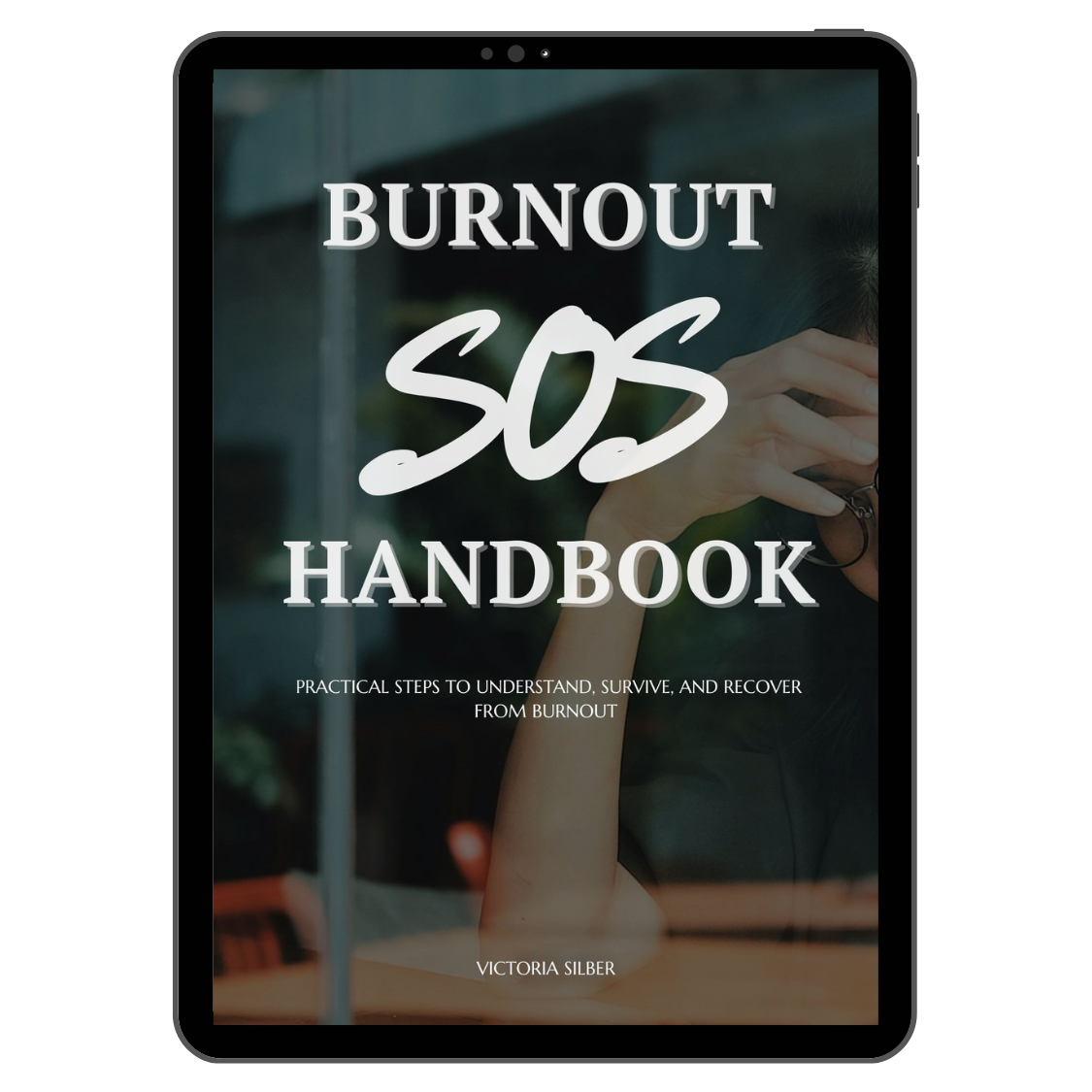Irritability and Burnout: Why Everything Annoys You
Burnout irritability is when everything annoys you.
Small inconveniences feel unbearable. Colleagues who used to be tolerable now drive you crazy.
Your partner asks a simple question, and you snap. Your children make normal kid noise, and you lose your temper.
This is not your personality.
This is not who you are. This is burnout affecting your emotional regulation and nervous system. When you are chronically stressed and depleted, your brain cannot filter or manage emotions effectively.
Everything feels like too much.
I became unbearably irritable during my burnout.
I snapped at my children over minor things. I felt rage over small inconveniences. I was not an angry person before burnout, and I felt ashamed of how I was behaving.
I did not understand that irritability was a symptom, not a character flaw.
This post explains why burnout causes irritability, how it affects your relationships, and what you can do to manage it while you recover.
What Is Burnout Irritability?
Burnout irritability is heightened sensitivity to stressors, reduced emotional tolerance, and increased anger or frustration.
It is one of the most common burnout symptoms, and it often appears before other signs become obvious.
Irritability is not the same as occasional frustration or bad moods.
It is a persistent, disproportionate emotional response to everyday situations. Things that would normally be minor annoyances feel intolerable.
You overreact, snap at people, or feel rage over small inconveniences.
Common signs of burnout irritability include:
Snapping at colleagues, family, or friends over minor issues
Feeling annoyed by normal sounds, behaviors, or requests
Overreacting to small inconveniences (traffic, delays, mistakes)
Feeling rage or anger that feels disproportionate to the situation
Reduced patience with people, tasks, or processes
Feeling on edge or tense most of the time
Regretting outbursts but feeling unable to control them
Burnout irritability is not a personality flaw.
It is a physiological response to chronic stress and nervous system dysregulation.
Your brain is overloaded, and your emotional regulation systems are failing.
Why Burnout Causes Irritability
Burnout irritability happens because chronic stress dysregulates your nervous system, depletes your emotional resources, and impairs your brain's ability to manage emotions.
Your nervous system is stuck in fight-or-flight mode
When you are chronically stressed, your sympathetic nervous system stays activated.
This keeps you in a state of hypervigilance and reactivity.
Small stressors trigger disproportionate responses because your body is already primed for threat.
Your prefrontal cortex is impaired
The prefrontal cortex is responsible for emotional regulation, impulse control, and rational thinking.
Chronic stress impairs this part of your brain, making it harder to pause, reflect, or respond calmly.
You react instead of responding.
Your emotional resources are depleted
Emotional regulation requires energy.
When you are exhausted from chronic stress, you do not have the energy to filter, manage, or modulate your emotions.
Everything feels overwhelming because you have no buffer left.
Your stress hormones are dysregulated
Chronic stress elevates cortisol and adrenaline.
These hormones keep you in a state of tension and reactivity.
You feel on edge, and your threshold for frustration is much lower than normal.
You are experiencing compassion fatigue
If you work in a high-demand role where you support, manage, or care for others, you may experience compassion fatigue.
This is emotional exhaustion from constant empathy and caregiving. You have no patience left for anyone, including yourself.
I was constantly on edge during my burnout.
My nervous system was so dysregulated that I could not tolerate normal noise, interruptions, or requests.
How Irritability Strains Relationships
Burnout irritability damages relationships at work and at home.
People around you do not understand why you have changed. They may feel hurt, confused, or resentful.
At work, irritability creates conflict and tension. You snap at colleagues, lose patience with clients, or react harshly to feedback.
This damages your professional reputation, erodes trust, and creates a hostile work environment. People may start avoiding you or complaining about your behavior.
At home, irritability damages your closest relationships. You snap at your partner over small things.
You lose your temper with your children. You withdraw from family and friends because you cannot manage your emotions around them. Your loved ones may feel like they are walking on eggshells.
Irritability creates guilt and shame. After an outburst, you feel terrible.
You regret what you said or how you reacted. You apologize, but the pattern repeats. This cycle of irritability, regret, and shame deepens your emotional exhaustion and worsens burnout.
People may not recognize it as burnout. They may think you are just stressed, moody, or difficult.
They may not understand that irritability is a symptom of a serious health condition. This lack of understanding can lead to blame, resentment, or relationship breakdown.
I damaged relationships during my burnout. I snapped at my children, withdrew from friends, and became defensive with colleagues. I felt ashamed, but I could not control my reactions.
I did not have the emotional capacity to regulate myself.
The Connection Between Anger and Burnout
Anger is a common but often overlooked symptom of burnout.
It can show up as irritability, frustration, rage, or resentment.
Anger is a stress response. When you feel overwhelmed, powerless, or trapped, anger is your body's way of trying to regain control or push back against the stressor.
It is a fight response, and it signals that your nervous system is in overdrive.
Anger masks deeper emotions. Beneath anger, there is often fear, sadness, helplessness, or grief.
Anger feels more powerful and less vulnerable than these emotions, so your brain defaults to anger as a protective mechanism.
Anger is a sign of boundary violations. If you feel angry all the time, it may be a sign that your boundaries are being violated.
You are doing too much, tolerating too much, or sacrificing too much. Anger is your body's way of saying, "This is not okay."
Chronic anger is exhausting. Anger requires energy.
When you are already depleted, chronic anger drains you further. It also keeps your nervous system activated, which prevents rest and recovery.
I felt constant, simmering rage during my burnout. I was angry at my workload, my clients, my circumstances, and myself. I did not realize that anger was a symptom of burnout and a sign that my boundaries had been violated for too long.
How to Manage Burnout Irritability
Managing burnout irritability requires addressing the root cause (chronic stress and nervous system dysregulation) while developing short-term coping strategies.
Step 1: Recognize irritability as a symptom
Irritability is not a character flaw.
It is a sign that your nervous system is dysregulated and your emotional resources are depleted. Acknowledge it without shame, and understand that it will improve with rest and recovery.
Step 2: Reduce your stressors
You cannot manage irritability while maintaining the same level of stress.
Reduce your workload, set boundaries, delegate tasks, and take time off. Your nervous system needs relief to regulate.
Step 3: Practice nervous system regulation
Daily practices that calm your nervous system reduce irritability over time.
Try deep breathing, progressive muscle relaxation, gentle movement, or time in nature. These practices teach your body to shift out of fight-or-flight mode.
Step 4: Create space before reacting
When you feel irritation rising, pause.
Take three deep breaths. Count to ten. Walk away if possible.
This creates space between the trigger and your response, allowing your prefrontal cortex to engage.
Step 5: Communicate your state to others
Let colleagues, family, and friends know that you are burned out and struggling with irritability.
This does not excuse your behavior, but it helps them understand what is happening.
Ask for patience and support.
Step 6: Apologize when you overreact.
When you snap or overreact, apologize sincerely.
Acknowledge the impact of your behavior and take responsibility. This repairs relationships and reduces guilt.
Step 7: Seek professional support
If irritability is severe or damaging your relationships, work with a therapist or burnout coach.
They can help you process emotions, develop coping strategies, and address the root causes of burnout.
I managed my irritability by reducing my workload, practicing breathwork, and communicating with my family. I also apologized frequently and asked for patience. It took months, but my irritability decreased as my nervous system regulated.
When Irritability Signals Deeper Issues
Irritability is a common burnout symptom, but it can also signal deeper issues that require attention.
If irritability is accompanied by thoughts of self-harm or harming others, seek immediate help. This is a mental health crisis, not just burnout.
Contact a doctor, therapist, or crisis hotline immediately.
If irritability persists despite rest and intervention, you may have an underlying condition. Anxiety disorders, depression, ADHD, hormonal imbalances, or chronic pain can all cause irritability.
See a doctor for evaluation.
If irritability is tied to a toxic work environment, leaving may be necessary. If your workplace is abusive, exploitative, or unsustainable, no amount of self-care will fix the irritability. Sometimes the healthiest decision is to leave.
If irritability is damaging your relationships beyond repair, prioritize recovery. Relationships are too important to sacrifice to burnout.
Take extended time off, seek professional help, and make recovery your top priority.
FAQ
Is irritability a normal part of burnout?
Yes.
Irritability is one of the most common signs of burnout. It happens because chronic stress dysregulates your nervous system and depletes your emotional resources.
It improves with rest, nervous system regulation, and addressing the root causes of burnout.
How long does burnout irritability last?
It depends on severity and intervention.
Mild irritability may improve in weeks with rest and stress reduction. Severe irritability, especially in stage 4 or stage 5 burnout, can take months to resolve and often requires professional support and significant life changes.
Can irritability damage my relationships permanently?
It can, but it does not have to.
Apologize sincerely, communicate what is happening, and take action to recover. Most relationships can heal if you take responsibility, seek help, and make changes.
However, if irritability leads to abuse or severe harm, professional intervention is necessary.
What is the difference between burnout irritability and an anger problem?
Burnout irritability is a symptom of chronic stress and nervous system dysregulation.
It improves with rest and recovery. An anger problem is a persistent pattern of aggression or hostility that exists regardless of stress levels.
If irritability persists after burnout recovery, you may need anger management support.
Should I take medication for burnout irritability?
Medication is not typically prescribed for irritability alone.
However, if irritability coexists with anxiety, depression, or severe nervous system dysregulation, medication may help stabilize your mood while you address the underlying burnout. Always work with a doctor to determine the right treatment.
Conclusion
Burnout irritability is when everything annoys you because your nervous system is dysregulated and your emotional resources are depleted.
It is not a character flaw. It is a symptom of chronic stress.
Irritability strains relationships, creates guilt, and worsens burnout. But it is manageable with rest, nervous system regulation, boundaries, and professional support. You are not a bad person. You are burned out.
If you need structured support to recover from burnout and manage irritability, explore the Burnout Recovery Accelerator. It is designed for professionals who need clarity, rest, and a step-by-step path back to themselves.
Ready to recover? Get Your Burnout SOS Handbook:

Burnout SOS Handbook: Practical steps to understand, survive, and recover from your burnout. Easy to follow - just right for a brain-fogged head. Start your healing today!
Take the Burnout Test
Our 5-minute Burnout Test cuts through the confusion and gives you a personalized snapshot of where you stand and what comes next.
Start the test →

